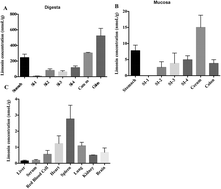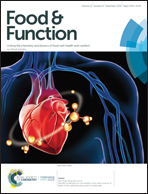The gastrointestinal fate of limonin and its effect on gut microbiota in mice†
Abstract
The gut microbiota plays a critical role in human health. Diets could modulate the gut microbiota, which in turn may contribute to altered health outcomes by way of changing the relative risk of chronic diseases. Limonin, widely found in citrus fruits, has been reported to possess multiple beneficial health effects. However, the gastrointestinal fate of limonin and its effect on gut microbiota remain unknown. Herein, mice were fed a diet containing 0.05% limonin (w/w) for 9 weeks. Liquid chromatography-mass spectrum analysis showed that limonin was concentrated along the gastrointestinal tract and reached 523.14 nmol g−1 in the colon lumen. Compared to control mice, colonic microbiota richness was significantly increased by limonin. Gut microbiota community was also clearly distinct from the control group as shown by Principle Coordinate Analysis. Additionally, the relative abundance of 22 genera (relative abundance >0.1%) was altered significantly. Among these, generally regarded probiotics (Lactobacillus and Bifidobacterium) were reduced, which was not due to direct inhibitory effect of limonin. According to the Kyoto Encyclopedia of Genes and Genomes (KEGG) database, amino acid metabolism, lipid, metabolism and immune system function were predicted to be upregulated, and immune system disease and infectious disease markers were predicted to be suppressed dramatically by limonin based on gut microbiota composition. Within the infectious disease category, bacterial toxin and Staphylococcus aureus infection markers were suppressed significantly with limonin treatment. Collectively, our study provides the first line of evidence that oral intake of limonin could shift gut microbiota composition and its functions, which warrants further investigation to determine its implication in human health.



 Please wait while we load your content...
Please wait while we load your content...
